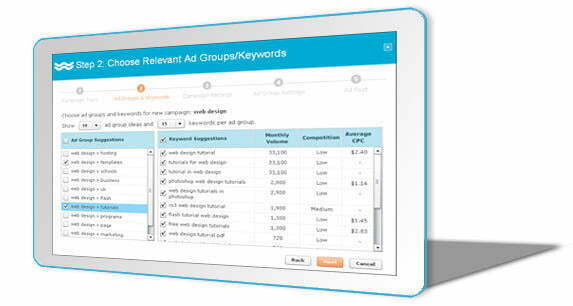
How Creating a Keyword Database Adds Value to Your Research
A keyword database is the most effective way to manage your keywords for paid and organic search marketing campaigns.
WordStream software allows you to create a scalable online keyword database that has a host of advantages over a typical keyword list or spreadsheet. A WordStream keyword database is:
- Private and proprietary
- Easy to organize and manage
- Easy to update
- Actionable
- Collaborative
Let’s take a closer look at each of these advantages.
Your Keyword Database is Private and Proprietary
The WordStream approach to keyword discovery differs from third-party keyword suggestion tools in that it draws more heavily from private keyword sources than public keyword sources. This approach to finding keywords is more effective for two main reasons: relevancy and competitive advantage.
Private data (data that comes from your own website’s log files and analytics) is more relevant because it’s derived from the real search queries used by actual visitors to your website. You’ll know with certainty which keywords are driving traffic and conversions—you won’t have to guess based on relative volume estimates.
Private data is also more competitive. Tools like Google’s AdWords keyword tool provide the same generalized data to everyone. With WordStream, your keywords are yours and yours alone; no one else has access to them.
Your Keyword Database is Manageable and Self-Organizing
An Excel spreadsheet is fine for housing 50 or 100 keywords. But search campaigns that succeed in the long-term require much more extensive keyword lists. Some high-performance PPC accounts grow into the millions of keywords.
When you’re dealing with large amounts of keywords, a database just makes more sense. It’ s far easier to manage and organize hundreds or hundreds of thousands of keywords with software designed for this purpose. WordStream includes a Free Keyword Tool that makes it easy to turn your keyword database into a logical, well-organized hierarchy. The software even suggests segmentations based on frequency and relevance.
The resulting keyword taxonomy will inform not only your pay-per-click campaign structure but your site’s information architecture as well. Keyword grouping is a best practice for increasing both paid and organic search traffic.
Your Keyword Database is Simple to Update
One of the major drawbacks of Excel is its static nature. You can take the time to organize a large list of keywords in a spreadsheet, but keeping it up-to-date is awkward and difficult—so most search marketers don’t. And if you don’t update and expand your keyword research efforts, your campaigns can’t grow and improve.
WordStream encourages ongoing keyword expansion; our tools make it easy to grow your database every day. Not only is your keyword database always growing, but thanks to our smart grouping tools, it stays organized and relevant—with very little additional work required from you.
Data from Your Keyword Database is Actionable
Another problem with keyword lists: That’s all they are, lists. You can’t actually do anything with the data where it lives. The keywords are isolated and inert. A WordStream keyword database is different because it’s both a dashboard and a workbench—you can group and analyze keywords in the same integrated application where you take action for tangible search marketing results.
An actionable keyword database improves productivity and drives traffic and conversions faster. In WordStream, you can act on your keyword data to:
- Form keyword groups and convert them into ad groups for PPC campaigns
- Scrub and deduplicate keyword groups for maximum relevancy and efficacy
- Automatically filter negative keywords from your groups and campaigns
- Associate keyword groups with content on your website
- Write targeted text ads with associated landing pages
And take other actions to optimize your site and AdWords account for organic and paid search.
Your Keyword Database is Collaborative
Finally, a WordStream keyword database is a collaborative workspace enabling coordinated efforts from multiple members of your team. A shared keyword database improves workflow processes across your search marketing operation. It ensures that everyone contributing to the effort is on the same page in terms of:
- Priorities and goals
- PPC and SEO best practices
- Completion and ownership of tasks
And more. WordStream is affordable, scalable, and hosted online, so it can be accessed from any computer with an Internet connection.
Managing your keywords in a feature-rich keyword database raises the value and relevance of your keyword lists while boosting the productivity of your entire search marketing team.
Learn More About Creating a Keyword Database
Sign up for a free trial of WordStream Advisor!
